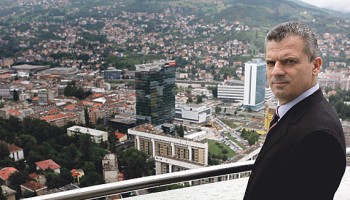Ramiz “Celo” Delalic was a well-known and popular guy in Bosnia and Herzegovina for his military service during the war, respected for his fierce defense of Sarajevo, both overt and covert.
He was also a mobster, and that’s what got him killed.
By 2006, enough tension had developed between rival crime families that accused crime boss Naser Kelmendi and his henchmen decided Delalic had to die, but this created a problem for them.
Who should do it?
According to a 49-page indictment filed by prosecutors working with the Special Prosecution Office of the Republic of Kosovo, finding just the right hit man is not that easy.
The indictment accuses Kelmendi and his organized crime group—including Fahrudin Radoncic, a former media mogul who is running for president of Bosnia and Herzegovina—of plotting to kill Delalic, mostly to protect Kelmendi’s extensive drug trafficking operations but for a couple of other reasons too.
On June 27, 2007, Delalic was shot to death in Sarajevo. Now Kelmendi is in custody in Kosovo, awaiting trial on murder and drug trafficking charges, while Radoncic is denying that he had anything to do with it.
In an interview with the Organized Crime and Corruption Reporting Project/CIN, Radoncic maintains that much of the evidence against him comes from the testimony of an interested party – a former employee and confidante who is also the wife of a Mafia figure.
According to a 49-page indictment filed by prosecutors working with the Special Prosecution Office of the Republic of Kosovo, finding just the right hit man is not that easy.
According to the indictment and witness accounts, pulling off the assassination took months of planning and several false starts.
Sejla Jugo Turkovic, a former TV journalist who worked for Radoncic’s media empire for a decade and became his trusted personal assistant, provided much of the inside information contained in the indictment.
“When they planned Ramiz’s murder, they had to go through several people to find someone,” she told OCCRP/CIN in the first of two extensive interviews.
“At the beginning Kelmendi suggested to (Radoncic) some names, Albanian names,” she said. “The Albanian names were unknown, they are not mentioned in any conflicts nor in criminal activities, they are from some backwoods, from some village near Pec,” Kelmendi’s hometown in Kosovo.
But a few days later Kelmendi dropped that idea, saying it would be too hard to organize getting the men to Sarajevo and helping them escape. The next idea was a candidate from East Sarajevo, “a man he had good relations with, but that man was also good with Ramiz, and so he refused,” Turkovic said. “He was offered 200,000 KM!” (US$ 134,000).
Two more prospects turned the job down before Kelmendi approached another mobster, Zijad “Zika” Turkovic, who Sejla Turkovic later married. He wasn’t interested either.
“When Naser asked Zijad if he could find someone Zijad said, ‘All you Albanians are crazy though, why don’t you kill him? Don’t involve me in that,’” Turkovic said. “They tried several times to find someone, and in the end [Serbian mobster Ljubisa “Cume” Buha] connected them with those people from Serbia, because Cume knew them.”
Prosecutors say several alleged organized crime figures had reason to want Delalic dead: Kelmendi because Delalic posed a threat to his lucrative drug business; and Ekrem Lekic because he believed Delalic was responsible for the murder of his relative Selver Lekic (who was Radoncic’s close friend), about two months previously.
Radoncic told OCCRP/CIN that it was nonsensical to think he blamed Delalic for Lekic’s death, because the man who killed Lekic, Mersudin Cosovic, was convicted of the crime and is imprisoned in Serbia; Ekrem Lekic agreed in an interview that the prosecution theory is absurd.
Delalic had also somehow angered Buha, the Belgrade mobster, although neither the indictment nor Turkovic spelled out exactly what Buha’s beef with Delalic was. Darko Elez, a Serbian mobster, told prosecutors that the three hit men who ultimately did the job had been recruited by Buha at Kelmendi’s behest.
Working through another Serbian mobster named Milan “Sandokan” Ostojic, the team of Strahinja Raseta, Milan Mitic and Nebojsa “Cetnik” Vukomanovic was assembled, according to the indictment.
Mitic, who denies his own involvement, told prosecutors that Raseta “was a member of an organized criminal group from the Serbian town of Sabac,” which was led by Sandokan and had “perpetrated many murders in Sabac and beyond.” According to Mitic, Sandokan would generally organize the operation, with Vukomanovic’s help, while Raseta would act as executioner.
Raseta’s parents confirmed to prosecutors that their son had been hired to kill Delalic, but said that Sandokan had first received the commission from yet another mobster, Milovan “Krce” Jeremic. They also said Kelmendi had paid € 200,000 (US$ 263,000) for the hit.
(Raseta was unavailable for interrogation, as he blew himself up in 2008 while planting a bomb under Mitic’s car. Police theorize that the two fell out over dividing the booty from the US$ 2.6 million robbery of the Split post office that year.)
Turkovic said Kelmendi was happy with the team “because one of them, Raseta, already did a job for Naser, and he did not have to deal with him and ensure his transport over the border. And he said that it is best to do this with Serbs, because they would organize it all on their own. The only thing we have to do is to find an apartment for them here, and the rest is up to them.”
According to Turkovic, the Serbian hit team moved into an apartment in Hrasno, a neighborhood in Sarajevo, where they stayed for some time, tracking Delalic’s movements. She said she tried to warn him, but had to choose her words carefully.
“I tried to tell him indirectly, so that he would not go to the police and say that I was the one who gave him the information. Because that same night I would have received a bullet in the head,” she said.
“However, when he didn’t take me seriously, I then told him, ‘Listen to me, I was there when they agreed to kill you. You will be killed! It’s been paid! … Don’t be stupid, don’t lose your head, understand!’
“He said, ‘You are around Albanians too much and with Fahro, they brainwashed you. They can’t approach me, how do you not understand that!? They can’t come to me!’ I said, ‘They can! Believe me that they can!’ And it ended like that.”







